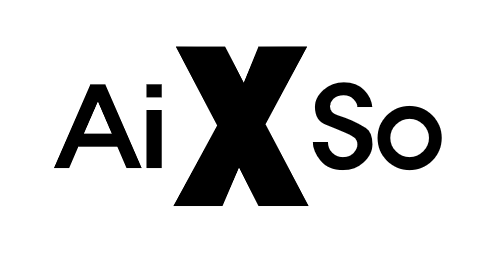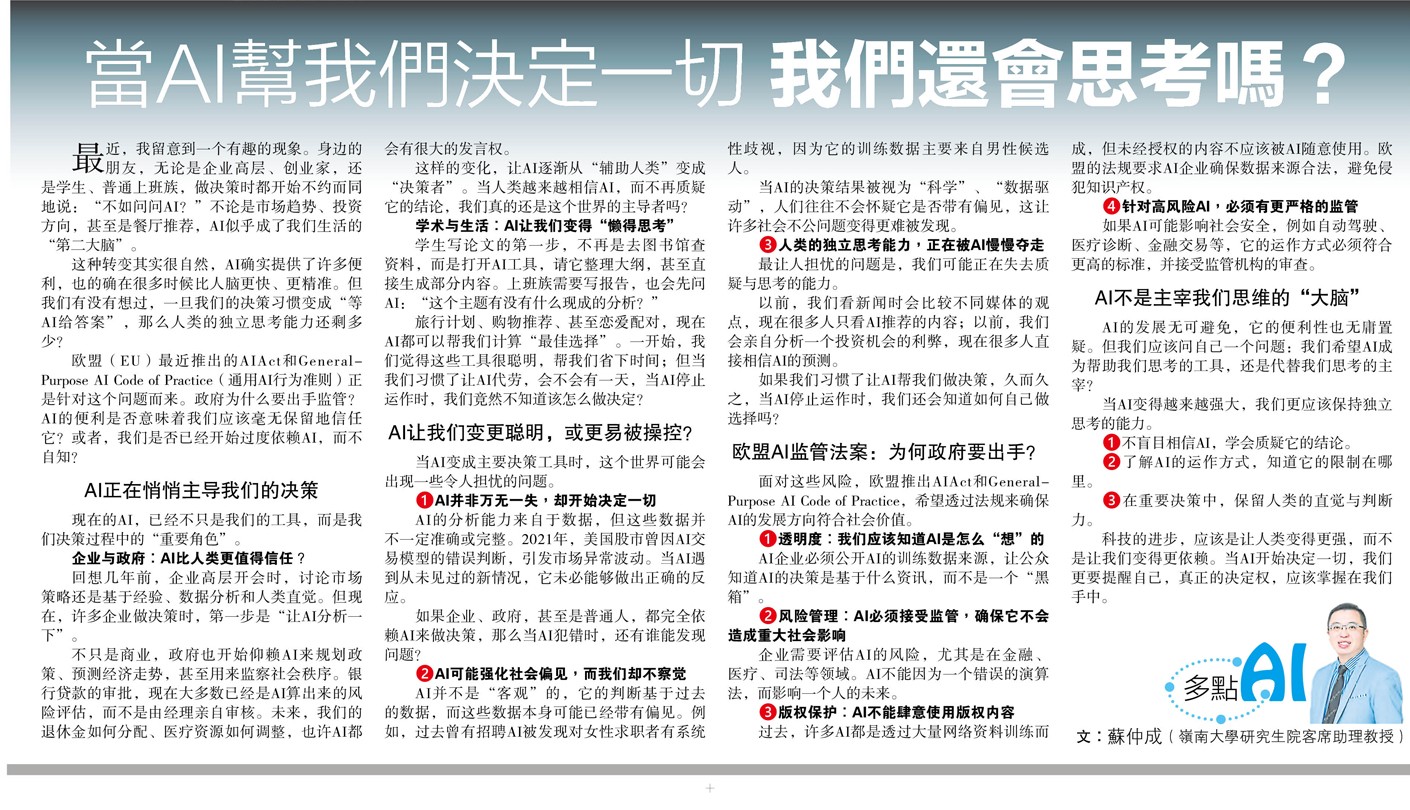When AI Makes All Our Decisions, Will We Still Think for Ourselves?
Lately, I’ve noticed an interesting trend. Friends around me—whether they are corporate executives, entrepreneurs, students, or office workers—have all started saying the same thing when it comes to decision-making: “Why not ask AI?” Whether it’s analyzing market trends, choosing investments, or even picking a restaurant, AI seems to have become our “second brain” in daily life.
This shift is quite natural. AI does provide tremendous convenience and is often faster and more accurate than the human brain. But have we considered—if our decision-making habit becomes “wait for AI to give an answer,” how much independent thinking do we have left?
The European Union’s recently introduced AI Act and General-Purpose AI Code of Practice are direct responses to this concern. Why are governments stepping in to regulate? Does the convenience of AI mean we should trust it unconditionally? Or are we already becoming overly dependent on AI without realizing it?
AI Is Quietly Taking Over Our Decision-Making
Today’s AI is no longer just a tool—it’s becoming a key player in our decision-making process.
Businesses and Governments: Is AI More Trustworthy Than Humans?
Just a few years ago, when executives gathered to discuss strategies, decisions were still based on experience, data analysis, and human intuition. Now, many businesses begin by saying, “Let’s have AI analyze it first.”
It’s not just the corporate world. Governments are also increasingly relying on AI to draft policies, forecast the economy, and even monitor social order. Most bank loan approvals are now based on AI-generated risk assessments rather than reviewed by a human manager. In the future, AI could play a huge role in how we allocate pensions and adjust medical resources.
In this transformation, AI is gradually shifting from “assistant” to “decision-maker.” As humans become more trusting of AI—and stop questioning its conclusions—are we still truly in control?
Academia and Daily Life: Are We Becoming Too Lazy to Think?
For students, writing a paper no longer starts with library research, but with opening an AI tool that drafts outlines—or even writes content. Office workers writing reports often begin with: “Does AI already have an analysis on this?”
Planning trips, shopping, even dating—AI helps us calculate the “best choice.” At first, we saw these tools as smart time-savers. But once we get used to offloading our thinking, will we still know how to make decisions if AI stops working one day?
Is AI Making Us Smarter or Easier to Manipulate?
As AI becomes our primary decision-making tool, several serious concerns may arise:
1. AI Is Not Infallible—Yet It’s Deciding Everything
AI’s intelligence depends on data, but that data may be incomplete or flawed. In 2021, the U.S. stock market experienced unusual fluctuations due to errors in AI trading models. When AI faces unfamiliar situations, it may not respond correctly.
If businesses, governments, and individuals all rely entirely on AI to make decisions, who will notice when it makes a mistake?
2. AI May Reinforce Social Bias—And We Don’t Even Notice
AI is not “objective.” Its decisions are based on past data, which may already be biased. For example, recruitment AIs have been found to systematically discriminate against female applicants because their training data was dominated by male candidates.
Since AI decisions are often viewed as “scientific” and “data-driven,” people rarely question whether bias exists—making social inequalities harder to spot.
3. Human Critical Thinking Is Gradually Being Taken Over
The most worrying trend is our possible loss of the ability to think and question.
In the past, we would compare multiple media sources when reading the news. Now, many people just read what AI recommends. We used to personally weigh the pros and cons of an investment. Now, many simply trust AI’s forecast.
If we keep letting AI make decisions for us, will we still know how to choose for ourselves when AI stops?
Why the EU Is Introducing AI Regulations
To counter these risks, the EU has launched the AI Act and the General-Purpose AI Code of Practice to guide AI development in a direction that aligns with human values.
1. Transparency: We Must Know How AI “Thinks”
AI companies must disclose the data sources used to train AI so the public can understand the basis of its decisions—instead of treating it like a black box.
2. Risk Management: AI Must Be Regulated to Prevent Harm
Companies need to assess AI risks, especially in high-stakes areas like finance, healthcare, and justice. A flawed algorithm should not determine someone’s future.
3. Copyright Protection: AI Must Not Freely Use Protected Content
Many AI systems are trained using massive amounts of online content. But unauthorized use of such data is not acceptable. EU regulations require AI developers to ensure data sources are legal to prevent intellectual property violations.
4. Stricter Oversight for High-Risk AI
If AI could impact public safety—such as in autonomous driving, medical diagnostics, or financial trading—then it must meet higher standards and undergo regulatory review.
AI Should Be a Tool—Not the Master of Our Minds
AI’s development is inevitable, and its convenience undeniable. But we must ask ourselves: Do we want AI to help us think, or think for us?
As AI grows more powerful, we must work even harder to preserve independent thought.
- Don’t blindly trust AI—learn to question its conclusions.
- Understand how AI works and know its limitations.
- In major decisions, retain human intuition and judgment.
Technology should empower humanity—not make us more dependent. As AI begins to decide everything, let’s remind ourselves: The real power to decide should always remain in our hands.
當 AI 幫我們決定一切,我們還會思考嗎?
最近,我留意到一個有趣的現象。身邊的朋友,無論是企業高層、創業家,還是學生、普通上班族,做決策時都開始不約而同地說:「不如問問 AI?」不論是市場趨勢、投資方向,甚至是餐廳推薦,AI 似乎成了我們生活的「第二大腦」。
這種轉變其實很自然,AI 確實提供了許多便利,也的確在很多時候比人腦更快、更精準。但我們有沒有想過,一旦我們的決策習慣變成「等 AI 給答案」,那麼人類的獨立思考能力還剩多少?
歐盟(EU)最近推出的 AI Act 和 General-Purpose AI Code of Practice(通用 AI 行為準則)正是針對這個問題而來。政府為什麼要出手監管?AI 的便利是否意味著我們應該毫無保留地信任它?或者,我們是否已經開始過度依賴 AI,而不自知?
AI 正在悄悄主導我們的決策
現在的 AI,已經不只是我們的工具,而是我們決策過程中的「重要角色」。
企業與政府:AI 比人類更值得信任?
回想幾年前,企業高層開會時,討論市場策略還是基於經驗、數據分析和人類直覺。但現在,許多企業做決策時,第一步是「讓 AI 分析一下」。
不只是商業,政府也開始仰賴 AI 來規劃政策、預測經濟走勢,甚至用來監察社會秩序。銀行貸款的審批,現在大多數已經是 AI 算出來的風險評估,而不是由經理親自審核。未來,我們的退休金如何分配、醫療資源如何調整,也許 AI 都會有很大的發言權。
這樣的變化,讓 AI 逐漸從「輔助人類」變成「決策者」。當人類越來越相信 AI,而不再質疑它的結論,我們真的還是這個世界的主導者嗎?
學術與生活:AI 讓我們變得「懶得思考」
學生寫論文的第一步,不再是去圖書館查資料,而是打開 AI 工具,請它整理大綱,甚至直接生成部分內容。上班族需要寫報告,也會先問 AI:「這個主題有沒有什麼現成的分析?」
旅行計畫、購物推薦、甚至戀愛配對,現在 AI 都可以幫我們計算「最佳選擇」。一開始,我們覺得這些工具很聰明,幫我們省下時間;但當我們習慣了讓 AI 代勞,會不會有一天,當 AI 停止運作時,我們竟然不知道該怎麼做決定?
AI 讓我們變得更聰明,還是更容易被操控?
當 AI 變成主要決策工具時,這個世界可能會出現一些令人擔憂的問題。
- AI 並非萬無一失,卻開始決定一切
AI 的分析能力來自於數據,但這些數據並不一定準確或完整。2021 年,美國股市曾因 AI 交易模型的錯誤判斷,引發市場異常波動。當 AI 遇到從未見過的新情況,它未必能夠做出正確的反應。
如果企業、政府,甚至是普通人,都完全依賴 AI 來做決策,那麼當 AI 犯錯時,還有誰能發現問題?
- AI 可能強化社會偏見,而我們卻不察覺
AI 並不是「客觀」的,它的判斷基於過去的數據,而這些數據本身可能已經帶有偏見。例如,過去曾有招聘 AI 被發現對女性求職者有系統性歧視,因為它的訓練數據主要來自男性候選人。
當 AI 的決策結果被視為「科學」、「數據驅動」,人們往往不會懷疑它是否帶有偏見,這讓許多社會不公問題變得更難被發現。
- 人類的獨立思考能力,正在被 AI 慢慢奪走
最讓人擔憂的問題是,我們可能正在失去質疑與思考的能力。
以前,我們看新聞時會比較不同媒體的觀點,現在很多人只看 AI 推薦的內容;以前,我們會親自分析一個投資機會的利弊,現在很多人直接相信 AI 的預測。
如果我們習慣了讓 AI 幫我們做決策,久而久之,當 AI 停止運作時,我們還會知道如何自己做選擇嗎?
歐盟 AI 監管法案:為何政府要出手?
面對這些風險,歐盟推出 AI Act 和 General-Purpose AI Code of Practice,希望透過法規來確保 AI 的發展方向符合社會價值。
- 透明度:我們應該知道 AI 是怎麼「想」的
AI 企業必須公開 AI 的訓練數據來源,讓公眾知道 AI 的決策是基於什麼資訊,而不是一個「黑箱」。
- 風險管理:AI 必須接受監管,確保它不會造成重大社會影響
企業需要評估 AI 的風險,尤其是在金融、醫療、司法等領域。AI 不能因為一個錯誤的演算法,而影響一個人的未來。
- 版權保護:AI 不能肆意使用版權內容
過去,許多 AI 都是透過大量網絡資料訓練而成,但未經授權的內容不應該被 AI 隨意使用。歐盟的法規要求 AI 企業確保數據來源合法,避免侵犯知識產權。
- 針對高風險 AI,必須有更嚴格的監管
如果 AI 可能影響社會安全,例如自動駕駛、醫療診斷、金融交易等,它的運作方式必須符合更高的標準,並接受監管機構的審查。
AI 是工具,而不是主宰我們思維的「大腦」
AI 的發展無可避免,它的便利性也無庸置疑。但我們應該問自己一個問題:我們希望 AI 成為幫助我們思考的工具,還是代替我們思考的主宰?
當 AI 變得越來越強大,我們更應該保持獨立思考的能力。
- 不盲目相信 AI,學會質疑它的結論。
- 了解 AI 的運作方式,知道它的限制在哪裡。
- 在重要決策中,保留人類的直覺與判斷力。
科技的進步,應該是讓人類變得更強,而不是讓我們變得更依賴。當 AI 開始決定一切,我們更要提醒自己,真正的決定權,應該掌握在我們手中。




